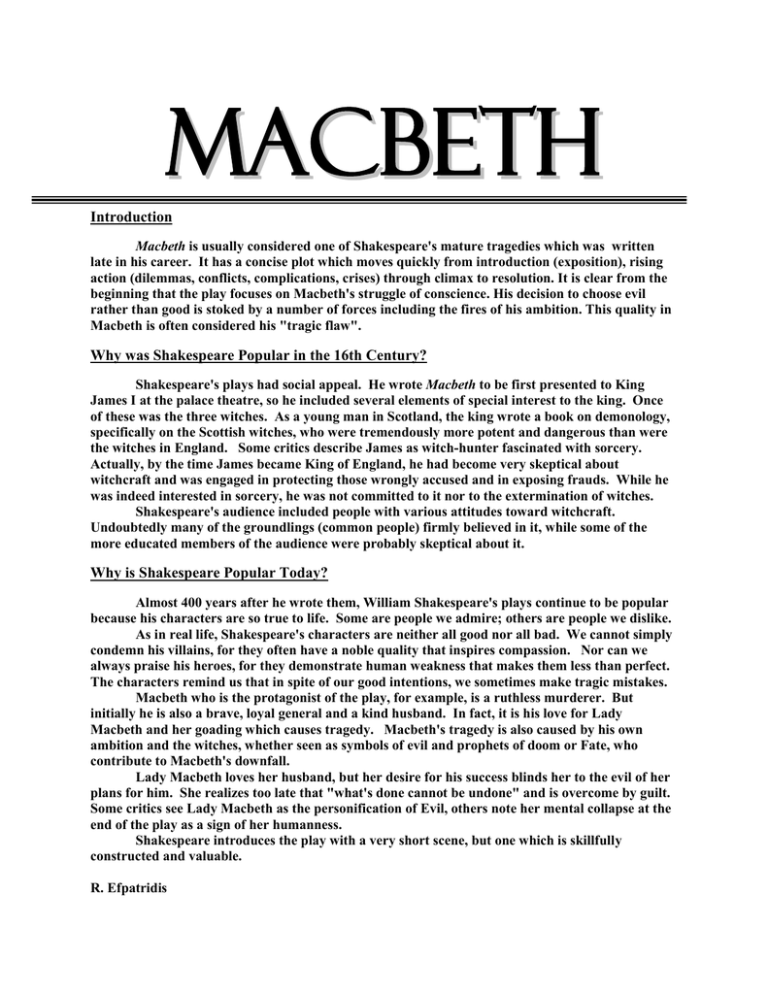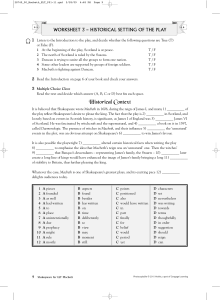M A C B
advertisement

MACBETH Introduction Macbeth is usually considered one of Shakespeare's mature tragedies which was written late in his career. It has a concise plot which moves quickly from introduction (exposition), rising action (dilemmas, conflicts, complications, crises) through climax to resolution. It is clear from the beginning that the play focuses on Macbeth's struggle of conscience. His decision to choose evil rather than good is stoked by a number of forces including the fires of his ambition. This quality in Macbeth is often considered his "tragic flaw". Why was Shakespeare Popular in the 16th Century? Shakespeare's plays had social appeal. He wrote Macbeth to be first presented to King James I at the palace theatre, so he included several elements of special interest to the king. Once of these was the three witches. As a young man in Scotland, the king wrote a book on demonology, specifically on the Scottish witches, who were tremendously more potent and dangerous than were the witches in England. Some critics describe James as witch-hunter fascinated with sorcery. Actually, by the time James became King of England, he had become very skeptical about witchcraft and was engaged in protecting those wrongly accused and in exposing frauds. While he was indeed interested in sorcery, he was not committed to it nor to the extermination of witches. Shakespeare's audience included people with various attitudes toward witchcraft. Undoubtedly many of the groundlings (common people) firmly believed in it, while some of the more educated members of the audience were probably skeptical about it. Why is Shakespeare Popular Today? Almost 400 years after he wrote them, William Shakespeare's plays continue to be popular because his characters are so true to life. Some are people we admire; others are people we dislike. As in real life, Shakespeare's characters are neither all good nor all bad. We cannot simply condemn his villains, for they often have a noble quality that inspires compassion. Nor can we always praise his heroes, for they demonstrate human weakness that makes them less than perfect. The characters remind us that in spite of our good intentions, we sometimes make tragic mistakes. Macbeth who is the protagonist of the play, for example, is a ruthless murderer. But initially he is also a brave, loyal general and a kind husband. In fact, it is his love for Lady Macbeth and her goading which causes tragedy. Macbeth's tragedy is also caused by his own ambition and the witches, whether seen as symbols of evil and prophets of doom or Fate, who contribute to Macbeth's downfall. Lady Macbeth loves her husband, but her desire for his success blinds her to the evil of her plans for him. She realizes too late that "what's done cannot be undone" and is overcome by guilt. Some critics see Lady Macbeth as the personification of Evil, others note her mental collapse at the end of the play as a sign of her humanness. Shakespeare introduces the play with a very short scene, but one which is skillfully constructed and valuable. R. Efpatridis





